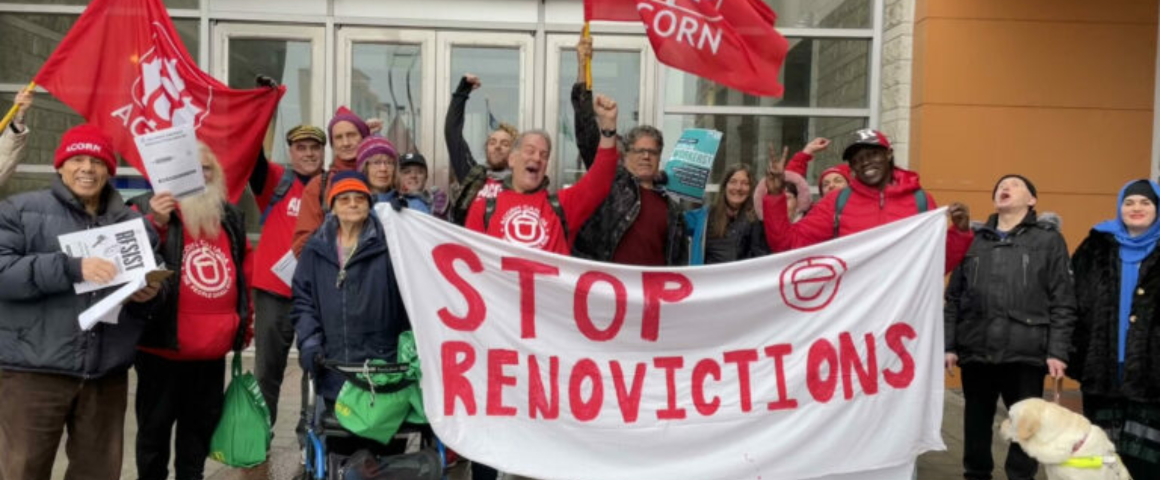By Ron Anicich
In a significant victory for tenant advocates, Toronto City Council has approved a comprehensive renovation license bylaw, marking a crucial step forward in protecting residents from displacement. The measure, which passed with near-unanimous support, represents the culmination of a persistent campaign by housing advocates who have been pushing for these protections since 2018.
The new bylaw establishes a robust framework for regulating residential renovations that could potentially displace tenants. Under the regulations, landlords will be required to pay a $700 per unit licensing fee and obtain proper building permits before proceeding with any substantial renovations. This systematic approach aims to prevent “renovictions” – a tactic where landlords use renovations as a pretext to evict tenants, often with the ulterior motive of increasing rents.
When renovations genuinely require tenant displacement, the bylaw mandates financial compensation for affected residents. Moreover, tenants who choose not to return to their units after renovations are completed will also receive compensation, preserving and reinforcing their existing rights under provincial law. These provisions create a significant financial deterrent against unnecessary evictions while ensuring that legitimate renovation projects can proceed with appropriate oversight.
The bylaw draws inspiration from Hamilton’s groundbreaking ordinance – the first of its kind in Ontario – but Toronto’s version reflects years of local advocacy and careful consideration of the city’s unique housing challenges. The measure addresses critical gaps in Ontario’s Residential Tenancies Act, which many argue has failed to adequately protect tenants since the current provincial government took office in 2018. Local advocates and city councilors have worked diligently behind the scenes for six years to craft legislation that specifically addresses Toronto’s housing market dynamics.
The implementation timeline, however, has sparked debate. The bylaw won’t take effect until July 31, 2025 – an eight-month delay intended to allow for educational initiatives and system preparation. Critics argue this creates a concerning gap in tenant protection, potentially allowing unscrupulous landlords to push through renovictions before the new regulations take effect. In response to these concerns, City Council has directed staff to explore interim protective measures, though specific solutions remain under development.
The measure faced minimal opposition in council, with Councilor Steven Holyday casting the sole dissenting vote. During council debate, Holyday argued that renovictions are relatively rare in Toronto and suggested that additional regulations would inevitably drive rental costs up. His theatrical use of actual red tape as a prop during the debate drew attention, though he struggled to articulate specific mechanisms by which the bylaw would increase housing costs.
A notable amendment to the bylaw, successfully introduced by Councilor Gord Perks, exempts rooming houses which the city has ordered to renovate. This pragmatic adjustment helps facilitate Toronto’s recent legalization of rooming houses by easing their path to compliance with city standards. The exemption recognizes the unique circumstances of rooming house operators working to bring their properties into compliance with newly applicable regulations.
The bylaw represents a significant shift in Toronto’s approach to tenant protection, acknowledging the need for proactive regulation in an increasingly challenging rental market. While the delayed implementation has raised concerns, the comprehensive nature of the protections signals a meaningful step toward addressing housing security in the city. As the implementation date approaches, both tenants and landlords will be watching closely to see how these new regulations reshape Toronto’s rental landscape.
[Photo: Acorn Canada]
Support working-class media!
If you found this article useful, please consider donating to People’s Voice or purchasing a subscription so that you get every issue of Canada’s leading socialist publication delivered to your door or inbox!
For over 100 years, we have been 100% reader-supported, with no corporate or government funding.




